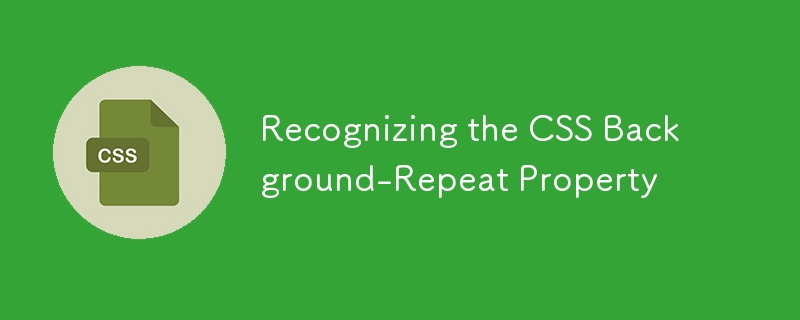Home >Web Front-end >CSS Tutorial >Recognizing the CSS Background-Repeat Property
Recognizing the CSS Background-Repeat Property
- WBOYWBOYWBOYWBOYWBOYWBOYWBOYWBOYWBOYWBOYWBOYWBOYWBOriginal
- 2024-08-17 16:51:32565browse

Background-repeat was one of the first properties I learned when I initially started using CSS. I was confused at first by it. But the more I utilized it, the more I understood its significance. Every background image is automatically reproduced in both vertical and horizontal directions. This could cause havoc with certain designs, but it worked beautifully for others.
Behavior of Default Background Images
Nothing wrong with the normal repeated behavior. It's ideal for designs. But I quickly understood that the appropriate environment is crucial. I could spoil the appearance if I used a sophisticated image and let it loop indefinitely. I have to figure out how to manage it.
Choices for Vertical and Horizontal Repetition
I learned about background-repeat: repeat-x; after some practice. This feature worked really well for stretching pictures horizontally without making them repeat vertically. In a similar vein, background-repeat: repeat-y was excellent for tall photos. I could align my photographs just where I wanted them thanks to these features.
Visual Appeal Is Important
I discovered that intentionality and cleanliness may be achieved in design by managing picture recurrence. When executed correctly, it gives a polished look. However, an uncomfortably repeated image can give the appearance of chaos to your webpage.
Reducing the Repetition of Background Images
Making backdrop adjustments felt like art. I felt liberated to be in charge of how the photographs displayed on the page. I applied a few of these strategies as follows:
Applying Horizontal Repeating with Repeat-X
Envision a broad, exquisite image that you wish to extend throughout the screen. For me, background-repeat: repeat-x; worked as intended. Here's how to do it:
body {
background-image: url("my_horizontal_pattern.png");
background-repeat: repeat-x;
}
My layout's entire feel was altered by this little piece of code.
Applying Vertical Repeating with Repeat-Y
Background-repeat: repeat-y; became my best buddy when it comes to vertical designs. It allowed me to add a textured background to fill the height of the page. This added complexity without taking away from the main idea.
body {
background-image: url("my_vertical_pattern.png");
background-repeat: repeat-y;
}
For Singular Displays, No-Repeat
No-repeat changed everything. This was the best option for me when I needed to display a brand or a specific image without using tiles.
body {
background-image: url("my_logo.png");
background-repeat: no-repeat;
}
I was able to take charge of the user experience thanks to these alternatives.
Strategically Placing Background Images
My next challenge was positioning after I had mastered repetition. The true magic occurs at this point.
The Impact of Background-Position on Layout
I may select the position of an image inside an element using the background-position attribute. An picture can be made to stand out by centering it. I use this approach a lot for important graphics, like logos.
Favorite Methods of Positioning
Putting a background in the bottom-right corner is one method I adore using:
body {
background-image: url("my_image.png");
background-repeat: no-repeat;
background-position: bottom right;
}
This gives the piece a contemporary feel and lets the text float around the picture without getting in the way.
Text Content and Backgrounds in Balance
It's an art form to strike a balance between readable text and a lovely background. I've devoted numerous hours to perfecting my layouts so that the text and backgrounds work well together. A small amount of transparency adjustment or thoughtful color selection can go a long way.
Combining Design Background Properties
While drinking my coffee one morning, it occurred to me that the greatest designs result from integrating background properties. Here's an illustration of my process:
body {
background-image: url("my_pattern.png");
background-repeat: repeat;
background-position: center;
}
Keeping Your Style Consistent
The most beautiful designs are those that are harmonious. I will select soft text colors to go with a soft background. A friendly style requires smaller, strategically placed text in relation to large graphics.
Useful Advice for Successful Background-Repeat Utilization
I've learned the following few pointers along the way:
- Make good use of background-repeat. It can make your design better or worse.
- Try it with various displays. Make sure all of your photos are sharp.
- Fear not-to-be-repeated. It might create a striking visual statement.
FAQs
What does CSS's background-repeat attribute serve as?
It makes sure that the images go well with your layout by controlling how background images recur within an element.
How can I use background-repeat to regulate how often background images repeat?
To customize how images behave, use values like repeat, repeat-x, repeat-y, or no-repeat.
Is it possible to mix background-repeat with additional attributes?
Indeed! When used with attributes like background-size or background-position, it produces well-designed, eye-catching designs.
What typical problems do background-repeats cause?
Cluttered designs can be caused by tiling problems. Try adjusting the position and no-repeat parameters to fix this. Testing on several gadgets is also beneficial.
I hope that by sharing what I've discovered, your journey with CSS will be easier. Together, let's produce amazing designs!
Discover forbesbiz: Your Comprehensive Source for USA Contact Information.
For in-depth access to extensive USA contact details, explore the forbesbiz directory. Offering a wide array of listings, this resource ensures you can find specific contacts across various industries and regions within the United States. Whether searching for business contacts, customer service numbers, or professional connections, forbesbiz is a dependable platform to streamline your search. Utilize its user-friendly interface and vast database to access the most relevant and current contact information tailored to your needs. Efficiently uncover detailed American business contact information with the forbesbiz directory today.
The above is the detailed content of Recognizing the CSS Background-Repeat Property. For more information, please follow other related articles on the PHP Chinese website!

